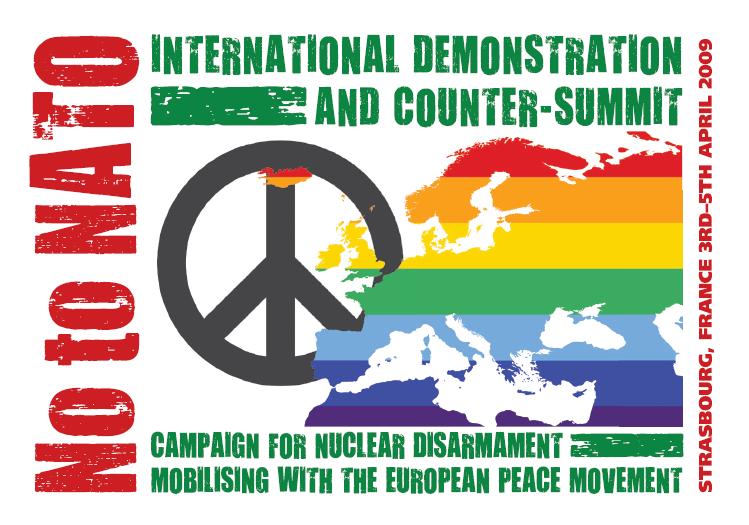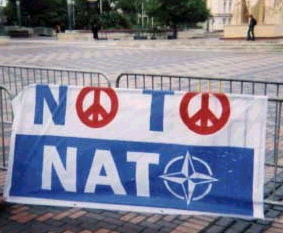Menu

Who needs NATO? Are we more secure?
No to NATO: from the Campaign for Nuclear Disarmament, UK (link on graphic above). |
|
"Our history shows that we will never accept occupation. We want liberation."
Afghan MP speaks out against Western occupation
Malalai Joya has become one of the fiercest critics of the occupation, and has travelled the world calling for occupation troops to withdraw... She spoke in summer 2009 to theStop the War coalition in central London.
One quote: "The US and Nato occupied our country in the name of 'women’s rights' and 'human rights'. They imposed their allies in the Northern Alliance on our people. That is why today’s situation in Afghanistan is close to a disaster."
Phyllis Bennis on Obama's foreign policy
March 11, 2009 in antiwar.com, courtesy Institute for Policy Studies
Holding Obama to His Promises
by Phyllis Bennis
"The meaning of President Obama's Iraq withdrawal speech, and its influence on real U.S. policy in Iraq, will not be determined solely by his actual words. The import of the speech – and whether its promises become real – will be determined by a fluid combination of what Obama says, his own definitions of what he says, and the disparate ways his speech is heard, perceived, described, and contested by others – the mainstream media, Congress, the military, other centers of elite power, and crucially, the peace movement..."
Frida Berrigan on NATO and Afghanistan
March 26, 2009
Frida Berrigan, Arms and Security Initiative
WHITHER NATO? The Alliance Celebrates 60 Years
War in Afghanistan, “Restart” with Russia and the Global Economic
Crisis…. Sounds like a lot for one meeting? It is probably not in even
half of the agenda for the 60th birthday party.
Oh yeah, and there will be tens of thousands of protesters (the police
already arrested hundreds of demonstrators in Brussels last weekend
and the meetings don't even begin for another week).
President Barack Obama will be in London and Strasbourg, and is
already laying the ground work for his message to NATO nations. He met
with NATO Secretary General Jaap De Hoop Scheffer on March 25th, and
afterwards told the press, “We have a set of challenges that require
NATO to shift from the 20th century to the 21st century -- issues of
terrorism, failed states, nuclear proliferation -- a whole host of new
challenges, as well as the traditional role that NATO has played in
preserving the territorial integrity of NATO members,” and he said,
with a new policy on Afghanistan, we will “become even more effective
in coordinating our efforts.” We'll hear more details of that 21st
century strategy tomorrow, when the White House releases their
Afghanistan plan.
Poland announced recently that it will provide another 400 troops for
the Afghan war effort, augmenting its 1,600 strong force. But other
nations—strapped for cash or (in the case of nations like the Czech Republic, Latvia, Iceland and others) collapsing politically—will have
a hard time contributing. Despite the fact that NATO is an alliance of
26 nations, the burden of “boots on the ground” has been heaviest on
just a handful of nations—only nine nations contribute more than 1,000
troops.
President Obama recently decided to send an additional 17,000 U.S.
troops to join the 38,000-strong U.S. force there, and he hopes to
double the size of the Afghan security forces 400,000 troops and
national police officers. Military operations in Afghanistan have been
carried out for a fraction of the costs of the war in Iraq, about $173
billion since 2001 (according to the Congressional Research Services’
most recent accounting, from October 2008), but with these new plans,
costs are likely to soar.
The New York Times reported that training and equipping the larger
Afghan force could cost between $10 and $20 billion over the next six
or seven years.
At the same time, a new Gallup poll finds that 42 percent of Americans
see the Afghanistan war as "a mistake." The President is hearing that
message from a nation fed up by war, and told 60 Minutes on Sunday
that "There's got to be an exit strategy. There's got to be a sense
that this is not perpetual drift."
The United Nations’ report on civilian casualties in Afghanistan found
a 40% increase in deaths between 2007 and 2008. And according to the
website, I-casualties U.S. military causalities increased 32% from
2007 to 2008. The administration is scheduled to release a new
Afghanistan policy tomorrow, and we’re hoping—for the sake of families
in Afghanistan and United States-- it is subtitled, “no perpetual
drift.”
RESOURCES:
“U.S. Plans Vastly Expanded Afghan Security Force,” New York Times,
March 18, 2009
http://www.nytimes.com/2009/03/19/us/politics/19military.html
“Deeper into Afghanistan,” San Francisco Chronicle
Editorial, March 26, 2009
http://www.sfgate.com/cgi-bin/article.cgi?f=/c/a/2009/03/26/ED6A16MRL...
AFGHANISTAN: Annual Report on Protection of Civilians in Armed
Conflict, 2008
Released in January 2009
http://www.unama-afg.org/docs/_UN-Docs/_human%20rights/2009/UNAMA_09f...
http://rethinkafghanistan.com/videos.php
“Sustainable Security in Afghanistan: Crafting an Effective and
Responsible Strategy for the Forgotten Front,” Center for American
Progress http://www.americanprogress.org/issues/2009/03/sustainable_afghanista...
Gallup Poll on Afghanistan War, March 2009
http://www.gallup.com/poll/116920/Optimism-Iraq-Less-Afghanistan.aspx
I Casualties
http://icasualties.org/oef/
No To NATO Coalition
http://www.no-to-nato.org/en/about-us/


 "The North Atlantic Treaty Organization (NATO) is a military alliance of 26 countries from North America (Canada and the US) and Europe (24 states, including the UK).
"The North Atlantic Treaty Organization (NATO) is a military alliance of 26 countries from North America (Canada and the US) and Europe (24 states, including the UK).